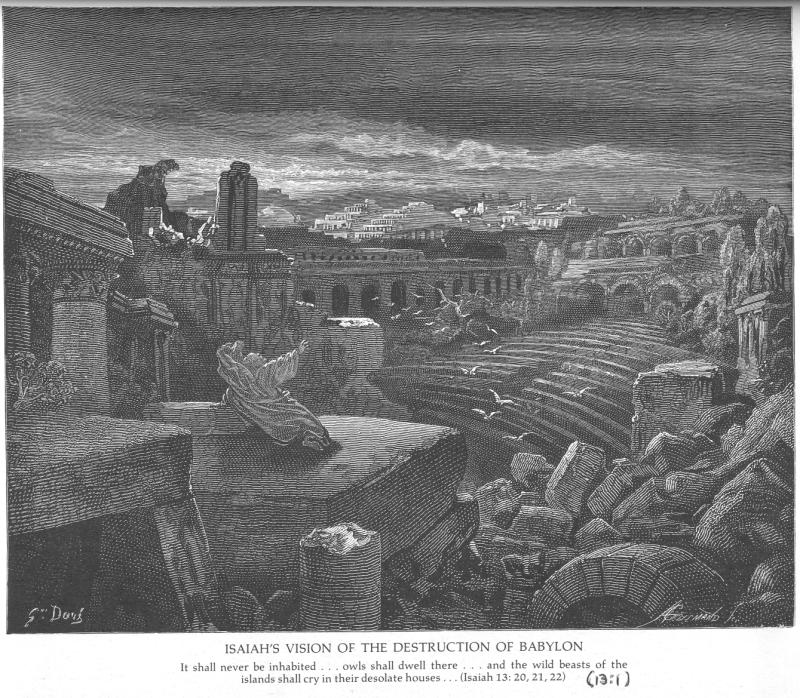The Babylonians attacked Judah in three waves, each more destructive and ruthless. Part of the reason is the rebelliousness of Judah toward its oppressors—a pattern repeated throughout history. In spite of the greater strength of the oppressing empire, and the urging of the prophets to submit (or repent and call upon God, which Judah refused to do), the kings of Judah (in their pride) rebelled and tried to form alliances with other empires. Thus, the Lord couldn’t save them because of their indifference to their covenants, and their oppressors became more and more angry. This had already happened when the northern kingdom of Israel fell to the Assyrians, and it would happen again under the yoke of the Romans from 70 to 150 A.D.
The northern tribes of Israel were already “lost.” They were lost in two ways. First, the Assyrians carried off many into their own empire. These eventually became assimilated, many later migrating to other areas of the Near East and Europe. Many of these converted to other faiths over the next many hundreds of years. One group repented and was led away by the Lord to parts unknown. This group is still intact, with whereabouts unknown to us. The Lord has promised that this group will return in a miraculous way. The Book of Mormon tells us that this group of the Ten Lost Tribes was visited by the resurrected Savior, and He must have organized His Church among them, as He did in the Holy Land, and again among the Book of Mormon peoples, who were descendants of Judah and Joseph.
The Destruction of the Temple
One effect of the Babylonian captivity was the destruction of the temple at Jerusalem. The people of Judah had defiled the temple, incorporating rites of worship common in Egypt and Babylon. The priests were corrupt, and so were the observances of the Holy Days and Sabbaths. With the destruction of the temple and the move to Babylon, worship became centered in the home, and in the synagogue. Many traditions were established in the home and in the synagogue that have been passed down from generation to generation.
The Best and the Brightest of Judah in Babylon
During Babylon’s first incursion into Judah, the best and brightest of the Jews were carried away. These were treated relatively well and assimilated (to a point) into Babylonian society. This yielded an increased sophistication, since Babylonian society was advanced. “The Jews were given a good deal of social freedom and economic opportunity. They proved to be enterprising in business and economic affairs, a gift valued by the Babylonians. The Babylonian Jews were allowed to move about freely, to live in their communities within or near the great cities, and to carry on their way of life. [1] Also, a body of Jewish scholars established itself in Babylon and did not return to Jerusalem, but sent insights and commentary and judgment out into the Jewish world from Babylon.
More Jews Outside than Inside
The word “diaspora” refers to Jews living outside the Holy Land. The Babylonian captivity hugely increased the number of Jews in diaspora. By the time of Christ, Jews in the diaspora outnumbered the Jews in the Holy Land. Most of the Jews of Babylon did not return to Jerusalem, but stayed in Persia (after Persia conquered Babylon) or migrated to other locations in the Middle East and Mediterranean. One large Jewish community was established after Alexander the Great conquered Persia, Egypt, and the Mediterranean. Alexandria became a large, bustling metropolis on Egypt’s Mediterranean coast. By the time of Christ, there were one million Jews in Alexandria.
Hebrew Drops out of Use
The language of Babylon was Aramaic. It was a Semitic language. By the time the captivity ended, most Jews spoke Aramaic. After Alexander the Great conquered his empire, the language of commerce and scholarship all over the Middle East and Mediterranean was Greek. Hebrew became solely the language of the scriptures, and most people could not speak or read it. The scribes, spoken of in the New Testament, became translators of scripture and the law to the common people. (Ezra was the great scribe who helped the Jews upon their return from Babylon.) Scriptures were translated later so that more people could read them. The Septuagent is the Greek translation of the scriptures, and had specifically the Jews of Alexandria in mind.
Idol Worship Ends
 Many of the Jews of Jerusalem were indulging in idolatrous practices before the captivity. This is a major reason why the Jews were destroyed. Some of those who were carried off into Babylon probably assimilated to the point that they lost their Jewish identity, but as a minority group in a foreign culture, the Jews mostly strengthened their identity and held more fast to their Jewish traditions. The next big threat to Jewish identity would be Hellenization, or Greek culture, but not idolatry.
Many of the Jews of Jerusalem were indulging in idolatrous practices before the captivity. This is a major reason why the Jews were destroyed. Some of those who were carried off into Babylon probably assimilated to the point that they lost their Jewish identity, but as a minority group in a foreign culture, the Jews mostly strengthened their identity and held more fast to their Jewish traditions. The next big threat to Jewish identity would be Hellenization, or Greek culture, but not idolatry.
There was a downside to this strengthening of devotion to Jewish tradition. Many were driven to build a hedge around the law, and rabbinical instruction tackled detail upon detail. For instance, the Mosaic Law commands that farmers should leave the corners of their fields unharvested, so the poor could glean from them. The question, “What are the corners of the field?” then unleashed much commentary and advice from Jewish sages. This carried the Jews beyond the mark, beyond the spirit of the law to the minor details, and it carried them away from being able to identify the Messiah when He came in the meridian of time.

